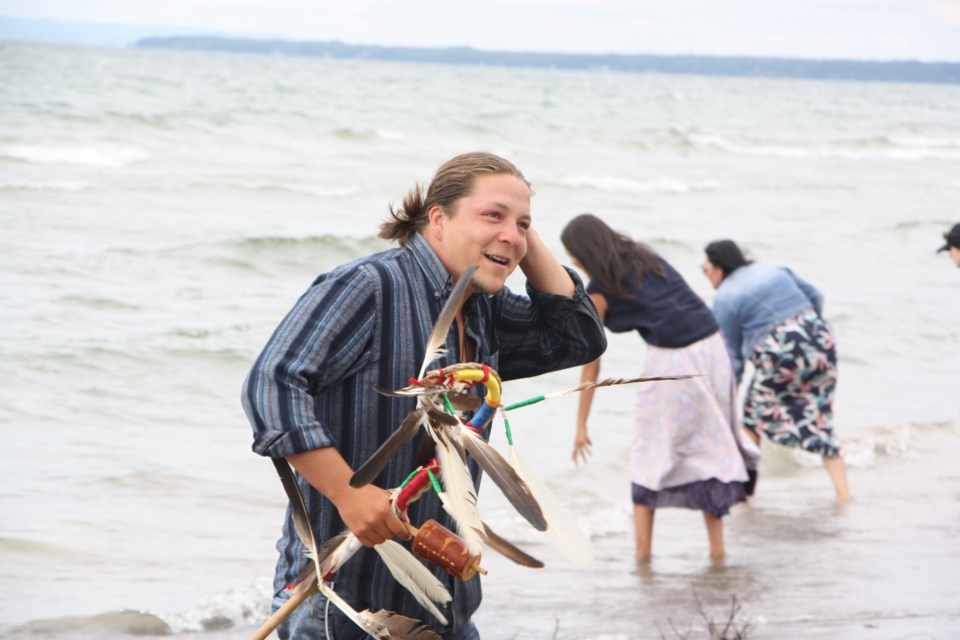After a month-long journey hugging the shores of Lake Huron in a canoe, Waasekom faced a gruelling final stretch as Georgian Bay waves and winds pushed back.
“We had to fight for every kilometre, and there were a few times where we were almost taken,” said Waasekom.
His journey began July 5 from Aazhoodenaang /Stoney Point then along the shores of Lake Huron to the northern point of the Saugeen Peninsula and then to the south shores of Georgian Bay, where he reached his destination in Wasaga Beach on Aug. 4.
“It seemed like we weren’t getting there,” said Waasekom after landing on shore. “So we were getting discouraged … The wind gusts were so powerful and we were getting tired from constantly fighting and being pushed to shore where the waves were even bigger.”
The struggle of that final stretch was a reminder of why he was on the journey.
“It reminded me of the work that our people have done to hold onto who we are, to hold onto this territory, and the taking care of this territory,” he said. “The responsibility we have is such an awesome and great responsibility.”
Waasekom, 27, is of the Saugeen Ojibway Nation. His month-long trip was a continuation of the 2017 Picking Up the Bundles Canoe Journey.
He was joined by several others who took turns paddling with him. For the final stretch, it was Waasekom and Carlene Keeshig of Neyaashiinigmiing.
“Some people will say this is just a canoe trip, but it’s so much more than that,” said Waasekom. “Because we’re stepping back for a moment to honour our ancestors, but we’re looking ahead to future generations who are going to inherit a very different place than we have now.”
When he arrived on shore, a crowd of friends, family, supporters, and community members were waiting for him. They cheered as he landed, and observed quiet moments as Waasekom and others made offerings in the water.
“This whole journey we’ve had to earn our way, so it was emotional because it was very much a metaphor for our people and where we’re at,” said Waasekom. “We’re coming back in a bigger way, and I know that scares people, but it’s actually good for the planet. It’s good for everybody. We’re the ones that are meant to take care of this land and this water here.”
As he journeyed along the shorelines, he witnessed highly developed areas with few natural spaces remaining.
“I think a lot of the western ideals are very toxic to the earth, being able to come and do whatever you want,” said Waasekom. “The Nottawasaga River is a spawning ground for Georgian Bay’s population of Sturgeon, which is an endangered species, an ancient being almost. And yet, we look along this river and it’s just blatant disregard.”
Picking up the Bundles Canoe Journey moved in ceremony, and also made space to educate, raise awareness, and tell stories, stated the Facebook page created for the event.
“We’ve encountered racism, arrogance, ignorance … but as we’ve been travelling, we’ve been finding people of like mind,” said Waasekom. “We’re not alone. And I don’t think it’s sustainable for anybody to think the Saugeen Ojibway people should be carrying that burden alone.”
As he paddled and meditated on his people’s role as stewards, he also sought to remind all people of their shared responsibility to the land and water.
“We’re all treaty people, it’s also your responsibility,” he said. “That was the spirit and intent of those agreements, but people forgot. And that’s why we’re doing this. To help people remember. It’s time now.”
Waasekom said change starts with recognizing the Saugeen Ojibway people, their place as stewards and caretakers, and respecting their voice.
He said they should not just be people who are consulted, but should be actual decision-makers alongside other decision-making bodies.
He sees danger in the exponential growth trends in the province, and feels a responsibility to protect the land and shore from degradation.
“Our burden is small compared to the land and the water shouldering the shadow cost of development, the shadow cost of consumerism,” said Waasekom. “We’re the balance, Indigenous people, we’re the buffer between. And that’s why it’s so important to recognize who we are and what our place is as decision-makers … We all care about the land. We all care about the water. So how do you translate that care into something that’s tangible? Stand with the native people.”
Waasekom and Carlene Keeshig landed at Wasaga Beach Area 1 on Aug. 4 at 3 p.m. There he and family, friends, supporters, and community members shared a feast.
To learn more about Picking up the Bundles Canoe Journey, you can visit the Facebook page.
“Our hearts are full and our bodies are tired,” wrote Waasekom in a thank you message. “We continue on the legacy of our great teacher, the ancestors and for the ones yet to come. Much of this work is only beginning.”



